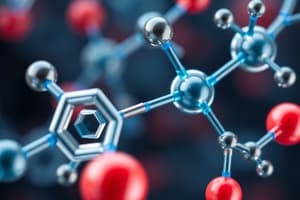Podcast
Questions and Answers
What is organic chemistry primarily concerned with?
What is organic chemistry primarily concerned with?
- Compounds containing carbon (correct)
- Compounds containing nitrogen
- Compounds containing hydrogen
- Compounds containing oxygen
How many valence electrons does carbon typically have?
How many valence electrons does carbon typically have?
- Three
- Six
- Eight
- Four (correct)
Which element is NOT commonly bonded to carbon in organic compounds?
Which element is NOT commonly bonded to carbon in organic compounds?
- Hydrogen
- Nitrogen
- Neon (correct)
- Oxygen
What type of bonds do organic chemists primarily study in compounds?
What type of bonds do organic chemists primarily study in compounds?
One important aspect studied in organic chemistry is the interactions during...
One important aspect studied in organic chemistry is the interactions during...
What are Halogens?
What are Halogens?
Which of the following is NOT a halogen?
Which of the following is NOT a halogen?
CH3OH is an example of a compound found in which branch of chemistry?
CH3OH is an example of a compound found in which branch of chemistry?
Study Notes
Organic Chemistry is a branch of chemistry that deals with compounds containing carbon. These compounds can range from small molecules like methane, C(CH₃)₄, to large biological macromolecules such as proteins. One important aspect of this field is understanding how different atoms bond together to form various types of structures. For instance, most organic chemists study bonds between carbon and hydrogen, oxygen, nitrogen, sulfur, phosphorus, and other elements known as heteroatoms. Carbon has four valence electrons it needs to share or gain to become stable. In order to do so, it forms covalent bonds with other atoms, especially those having enough electrons to complete their outer shells.
In addition to studying these bonds, organic chemists also analyze reactions involving organic compounds—how one chemical structure changes into another through reaction processes. They examine how atoms interact with each other during reactions by forming new chemical bonds or breaking existing ones. This process is fundamental for many applications, including creating bioactive compounds used widely in the pharmaceutical industry or figuring out what happens when humans absorb certain chemicals.
Another area within organic chemistry involves Halogen Derivatives. Halogens are nonmetal, highly reactive trace elements found primarily in ocean waters. Some halogen derivatives, such as bifunctional organohalogen builders, have been developed specifically for detergents which help remove stains from clothing more effectively, without leaving harsh residues behind. Additionally, some researchers believe that molecular iodine could potentially serve as a replacement for current halide salts, making future detergent products even better at cleaning while being gentler on clothes and fabrics. Therefore, halogen derivatives play an essential role in improving our everyday lives through innovations in laundry detergent technology.
Studying That Suits You
Use AI to generate personalized quizzes and flashcards to suit your learning preferences.
Description
Explore the fundamentals of organic chemistry, including the bonding behavior of carbon with other elements, the reactions involving organic compounds, and the importance of halogen derivatives in daily applications. Learn how atoms bond to create various structures and how reactions lead to the formation of new chemical compounds.




